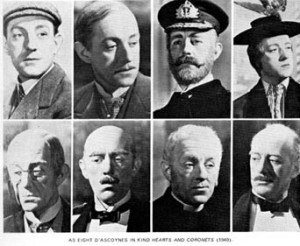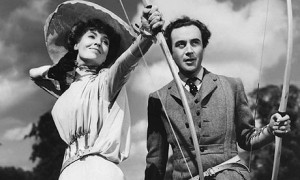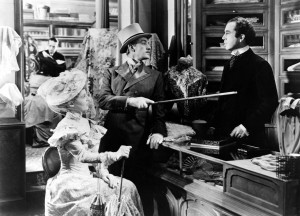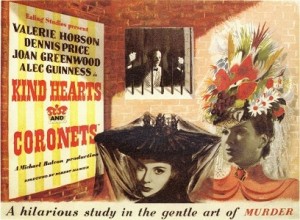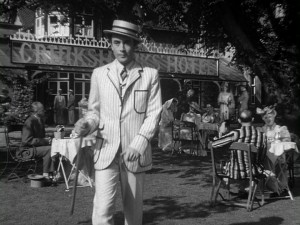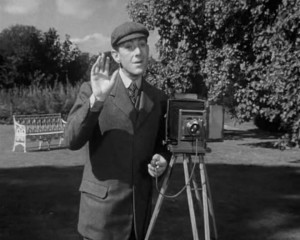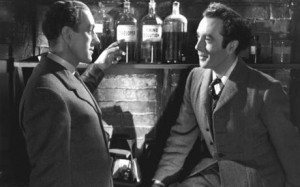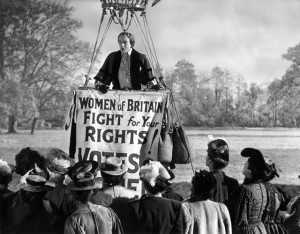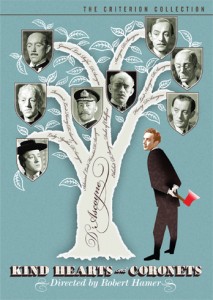Kind Hearts and Coronets ***** (1949, Dennis Price, Alec Guinness, Valerie Hobson) – Classic Movie Review 5
‘I shot an arrow in the air; she fell to earth in Berkeley Square.’
In his first film for Ealing Studios, Alec Guinness gives a brilliant display of his remarkable versatility and exquisite comic touch as all the eight members of the aristocratic D’Ascoyne family, memorably including Lady Agatha (!), in Robert Hamer’s marvellous, infectiously amusing, surprisingly cynical black comedy Kind Hearts and Coronets. It is a masterpiece of elegant British film-making, the cinema equivalent of an Oscar Wilde play. It’s that good.
How Wildean is this line from the Parson: ‘I always say my west window has all the exuberance of Chaucer without, happily, any of the concomitant crudities of his period’? Or this one from Louis: ‘While I never admired Edith as much as when I was with Sibella, I never longed for Sibella as much as when I was with Edith.’
Of course you expect Guinness to be dazzling, after all this is the film that established his star character actor reputation for submerging himself inside a wide range of different characters. He was hired to play four D’Ascoyne roles and asked to play all eight (the Parson was his personal favourite).
But it is the neglected Dennis Price who is the revelation here. He gives another of the film’s outstanding performances of great elegance and insouciance as the anti-hero who sets out to bump the entire family off. He plays Louis Mazzini, a lowly, penniless distant member of the clan whose mother was rejected by her D’Ascoyne family after running off with an Italian opera singer. (The film was made in 1949 and Italians were an easy target for hatred in the UK.)
And so, once grown up, Louis plots revenge for both his mother and himself and a great improvement in his own situation – all he has to do is to start murdering each member of the family so that, once they are all dead, he will be next in line and can inherit the dukedom and all its riches.
Valerie Hobson (Edith) and Joan Greenwood (Sibella) provide excellent, attractive support and all the small parts are entertainingly fleshed out by esteemed character actors like Miles Malleson (the hangman), Arthur Lowe (the reporter), Hugh Griffith (lord high steward) and Clive Morton (prison governor), while boy star Jeremy Spenser plays the young Louis and Audrey Fildes (in one of only two films she made) the spurned mother.
Robert Hamer directs his delightfully clever screenplay (co-written with John Dighton, loosely based on Roy Horniman’s 1907 novel Israel Rank: The Autobiography of a Criminal) with the greatest of ease and polished style. This is a film that truly starts with its lovingly crafted screenplay, and yet it is a supremely accomplished film in all departments, a highly polished, rare cinema gem that is enduringly enjoyable.
The title, incidentally, comes from a Tennyson poem: ‘Kind hearts are more than coronets. And simple faith more than Norman blood.’ Unlike the poem, the film is not preoccupied with goodness or kindness. Instead, Hamer set out to make a ‘picture that paid no regard whatever to established, although not practised, moral convention.’
Dennis Price quotes a line from John Gay: ‘How happy could I be with either, Were t’other dear charmer away!’, speaking of his dilemma of choosing between Joan Greenwood and Valerie Hobson. More exquisite cynicism: either one will do if the other one is absent.
While Alec Guinness remembered Hamer as looking and sounding like a scornful frog, Valerie Hobson remembered Hamer as ‘a genius, a very sophisticated man’.
The main cast are: Dennis Price, Alec Guinness, Valerie Hobson, Joan Greenwood, Miles Malleson, Arthur Lowe, Hugh Griffith, Jeremy Spenser, Clive Morton, Audrey Fildes, John Penrose, Cecil Ramage, John Salew, Eric Messiter, Lyn Evans, Barbara Leake, Peggy Ann Clifford, Anne Valery, Laurence Naismith, Richard Wattis, Carol White, Harold Young, Ivan Staff, Gordon Phillot, Leslie Handford and Nicholas Hill.
Kind Hearts and Coronets is directed by Robert Hamer, runs 106 minutes, is made by Ealing Studios, released by General Film Distributors, is written by Robert Hamer and John Dighton, loosely based on Roy Horniman’s novel Israel Rank: The Autobiography of a Criminal, is shot in black and white by Douglas Slocombe, is produced by Michael Balcon and Michael Relph, is scored by Ernest Irving, and is designed by William Kellner.
© Derek Winnert 2013 Classic Movie Review 5
Check out more reviews on http://derekwinnert.com/

